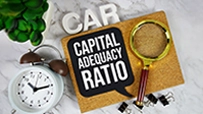The ABC of Taxation in India: A Beginner’s Guide to Taxes, Deductions & Compliance
Disclaimer: Ujjivan Small Finance Bank does not offer personal finance advice or products. Ujjivan SFB is not responsible for the accuracy of the information provided herein. This blog is written for generic information only.
September 03, 2025

Do your payslips often confuse you? Wondering why a part of your hard-earned income disappears every month or how some people seem to “save taxes” legally?
Welcome to the world of taxation—an essential but often misunderstood part of adulting in India. Whether you're a salaried employee, a freelancer, or running a small business, understanding how taxation works can save you from penalties, unlock eligible deductions, and help you plan your finances better.
But let’s face it: the Indian tax system can feel like an alphabet soup of sections, slabs, and exemptions.
That’s why this guide breaks it down simply—starting from A (Assessment & Applicability) to B (Benefits & Breaks) to C (Compliance & Credits). Let’s dive in!
What is Taxation and Why Does It Matter?
Taxation is how the government collects money from individuals and businesses to fund infrastructure, public welfare, healthcare, defence, education, and more. In India, taxes are imposed by both the Central Government and State Governments, and they fall into two major buckets: Direct Taxes and Indirect Taxes.
Types of Taxes in India
Direct vs Indirect Taxes Comparison
| Feature | Direct Tax | Indirect Tax |
| Paid by | Individual/Entities | Consumers (Collected via sellers) |
| Examples | Income Tax, Corporate Tax, Capital Gains | GST, Custom Duty, Excise Duty |
| Collected by | Directly by government | Through intermediaries (e.g., businesses) |
| Tax burden visibility | Visible to taxpayer | Hidden in the price of goods/services |
Who Has to Pay Income Tax in India?
The following groups are required to pay Income Tax if their income crosses the basic exemption limits:
Your residential status determines how your global income is taxed:
Tip: Even if your income is below the taxable limit, filing an ITR helps in getting loans, applying for visas, or claiming refunds.
Understanding Income Tax Slabs (FY2025-26)
India offers two tax regimes:
Old Regime vs New Regime (For Individuals Below 60 Years)
| Criteria | Old Regime | New Regime |
| Standard Deduction | ₹50,000 (Salaried only) | ₹75,000 (Salaried only) |
| Basic Exemption | ₹2.5 lakh | ₹4 lakh |
| Tax Rebate (u/s 87A) | Up to ₹5 lakh income – Rebate up to ₹12,500 | Up to ₹12 lakh income (effective 0 tax) – Rebate up to ₹60,000 |
| Deductions allowed | Yes (80C, 80D, HRA, etc.) | No (most deductions not allowed) |
| Complexity | Higher (more paperwork) | Simpler (fewer deductions to claim) |
Disclaimer: Kindly consult a Chartered Accountant (CA) for tax advisory. For FY 2024-25, under the new regime, the tax rebate is ₹25,000 for income within ₹7 lakh.
Understanding tax-saving opportunities is one of the smartest things you can do—especially if you're under the old tax regime, which allows multiple deductions and exemptions. These can significantly reduce your taxable income.
Popular Tax Deductions under the Old Regime
| Section | What It Covers | Official Deduction Limit |
| 80C | PPF, ELSS, LIC, EPF, tuition, etc. | ₹1.5 lakh |
| 80D | Health insurance premiums + preventive check-up | ₹25k/₹50k self + ₹25k/₹50k parents + ₹5k check-up |
| 80E | Interest on higher education loan | No limit (up to 8 years) |
| 80G | Donations to approved charities/funds | 50% or 100% (some no-limit; cash cap ₹2k) |
| 24(b) | Self-occupied home loan interest | ₹2 lakh |
| 80TTA | Savings account interest (non-seniors) | ₹10,000 |
| 80TTB | Deposit/savings interest (seniors) | ₹50,000 |
Tip: Combine 80C and 24(b) on a home loan to maximize benefits if you’ve taken one and also invest in tax-saving instruments.
Disclaimer: Kindly consult a Chartered Accountant (CA) for tax advisory.
Common Exemptions for Salaried Employees
Even outside deductions, there are allowances and exemptions that help reduce your taxable salary:
Example: HRA Calculation
Let’s say:
Exempt HRA = Least of the following:
1. Actual HRA received = ₹2,40,000/year
2. Rent paid – 10% of basic = (2,16,000 – 48,000) = ₹1,68,000
3. 50% of basic salary = ₹2,40,000
Exempt HRA = ₹1,68,000
Balance HRA is taxable.
Capital Gains – What You Need to Know
When you sell an asset (house, shares, mutual funds), any profit you make is taxed as Capital Gains.
1. Short-Term Capital Gains (STCG)
- Holding period: ≤ 12 months
- Tax Rate: 20% (revised from 15% as per Budget 2024)
- Holding period: ≤ 24 months
- Tax Rate: As per income slab
- Holding period: ≤ 36 months
- Tax Rate: As per income slab
Long-Term Capital Gains (LTCG)
Pro Tip: Use Section 54 to save tax on LTCG from property by reinvesting in another property.
What Income is Tax-Free?
Not all income is taxable. Here are common sources of exempt income:
Note: Gifts from relatives (parents, spouse, siblings, etc.) are fully tax-free. But gifts from friends, colleagues, or others are taxable if value exceeds ₹50,000.
Section Recap:
C – Compliance, Credits & Consequences
Knowing how much tax you owe is only half the battle. Complying with timelines, submitting the right forms, and understanding tax credits is what ensures you're on the right side of the law—and might even earn you a refund.
1. PAN, Aadhaar & KYC Compliance
PAN (Permanent Account Number)
Aadhaar Linking
Tip Box:
You can check and link PAN-Aadhaar at https://www.incometax.gov.in
2. How to File Income Tax Returns (ITR)
Who Should File?
TDS (Tax Deducted at Source) & Advance Tax
1. What is TDS?
2. When is TDS Applicable?
3. Advance Tax
Refunds and Tax Credits
Note: As of FY 2024–25, ₹4.35 lakh crore worth of refunds have been issued, a record high, showing the system is becoming more responsive.
Penalties & Legal Consequences for Not Filing ITR
| Filing Delay | Penalty |
| Filing after due date | ₹5,000 (₹5 lakh+) |
| Filing after due date | ₹1,000 (less than ₹5 lakh) |
Other risks include interest on unpaid taxes, scrutiny or IT notices and prosecution in extreme cases of evasion
Reminder: As per CBDT Circular No. 06/2025 dated 27th May 2025, the due date for filing ITR for AY 2025–26 has been extended from 31st July to 15th September 2025.
Common Tax Myths Debunked
Despite growing awareness, several outdated beliefs still prevent individuals from making informed tax decisions. Let’s bust some of the most common myths.
Myth #1: “If I don’t earn ₹5 lakh, I don’t need to file taxes.”
Fact: While it’s true that you may not owe tax if your income is under the exemption limit, you should still file your ITR:
Myth #2: “I can’t claim tax benefits under the new regime.
Fact: Though the new regime removes most deductions, some benefits still apply:
Tip: Always compare both regimes before filing.
Myth #3: “Only salaried people need to worry about TDS.”
Fact: TDS applies to interest income (FDs), rent, professional fees, property sales, and even payments to freelancers or consultants. It’s not just a salary deduction—it’s a tax compliance mechanism across income types.
Myth #4: “Gifts are never taxed.”
Fact: Only gifts received from specified relatives (parents, spouse, siblings, etc.) are tax-free. Gifts from non-relatives exceeding ₹50,000 per year are fully taxable under “Income from Other Sources.” Exemptions apply for marriage gifts or inheritance through a will.
Final Thoughts
Understanding the ABC of Taxation in India isn’t just about fulfilling a legal obligation—it’s about empowering yourself to make smarter financial choices. From learning how income is taxed, to making the most of deductions, and avoiding penalties through timely compliance, every aspect of taxation plays a role in shaping your financial well-being.
Whether you're salaried, self-employed, or running a business, knowing what to file, when to file, and how to optimize your taxes can lead to better savings, more accurate filings, and fewer headaches during tax season.
So don’t wait until July 31st each year to scramble—make taxation a year-round, informed habit.
FAQs
1. Which tax regime should I choose—old or new?
It depends on your income structure. If you claim deductions like 80C, 80D, and HRA, the old regime may offer more savings. If not, the new regime is simpler and offers lower slab rates.
2. Do I need to file ITR if I earn less than ₹2.5 lakh?
Legally, you may not need to. But it's advisable to file if:
• TDS was deducted
• You want to claim a refund
• You’re applying for a loan, visa, or government benefit
3. Can I claim both HRA and home loan deductions?
Yes, you can claim both if:
• You're living in a rented house and paying rent (HRA)
• You have taken a loan on a different property (Section 24b interest deduction)
4. Is agricultural income taxable?
Agricultural income is exempt from tax, but it may be used to calculate the tax rate on your non-agricultural income (via aggregation method).
5. What happens if I miss the ITR filing deadline?
You can file a belated return by December 31 of the same year, but:
• You’ll be charged a penalty (₹1,000 to ₹5,000)
• You can’t carry forward losses
• Refunds may get delayed
6. Is income from freelancing or side gigs taxable?
Yes. Freelance income is treated as business/professional income, and you may also need to pay advance tax quarterly if liability exceeds ₹10,000/year.
Latest Blogs

ITR-1 (Sahaj) Restrictions: Income Sources Not Allowed & Filing Rules
With just a few days left before the 15 September 2025 deadline for filing Income Tax Returns (ITRs) for Assessment Year (AY) 2025-26, many taxpayers are rushing to submit their forms online.

GST Rate Cut on Electronics: What It Means for Consumers and Retailers
India’s Goods and Services Tax (GST) system has entered a new era with the rollout of GST 2.0, effective from September 22, 2025.

Banking Safety Guide: How to Avoid QR Code Frauds While Making Payments
India’s love for QR code payments has made transactions lightning-fast, but also opened a new front for cybercriminals.

Scam Alert! Phishing, Vishing, and Smishing Can Drain Out Your Finances
Digital banking in India has transformed the way we manage money.

India’s New GST Reform Bill: What GST 2.0 Means for You
India’s indirect tax system is entering a landmark new phase.


